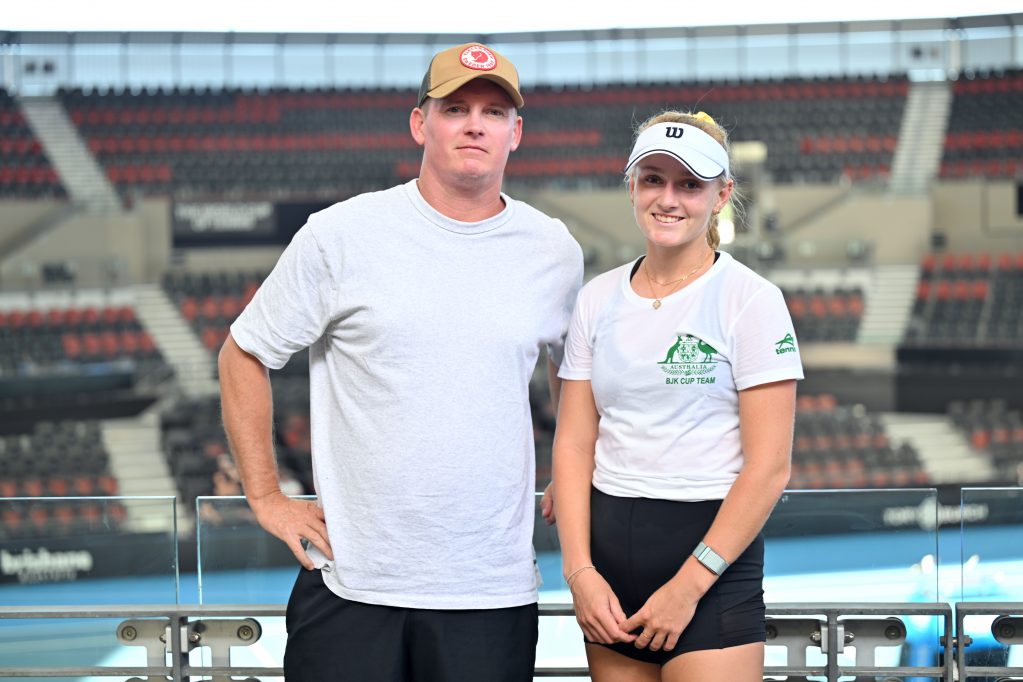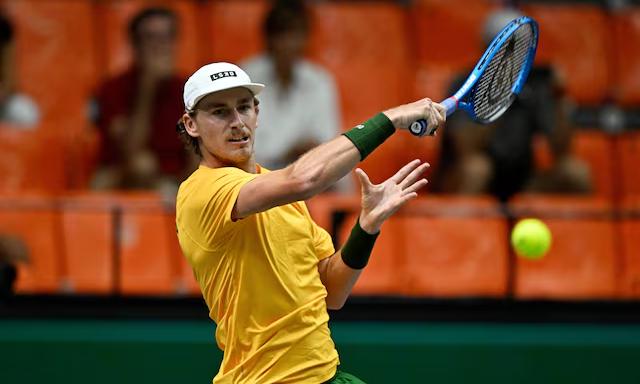Coaching spotlight: Brad Dyer embracing journey with rising star Taylah Preston

- by Admin
- May 22, 2024

Western Australian coach Brad Dyer has been working with Perth talent Taylah Preston since she was eight years old.
Perth, Australia, 22 May 2024 | Leigh Rogers
When an eight-year-old Taylah Preston first signed up for tennis lessons, Perth coach Brad Dyer had no idea of the journey they would soon embark upon together.
“You can never really know, but she had really good qualities as a person and was quite driven,” Dyer recalled of his first impressions.
Now in their 11th year of collaboration, Preston is one of Australia’s top-ranked women and verging on breaking into the world’s top 100.
“I think that’s pretty cool, because you don’t hear of that happening too often,” Dyer said of their enduring partnership.
“Often kids get to a certain age then find a different coach or move to a different academy. The grass is always greener, right?
“But Taylah and her parents have stayed extremely loyal to me. We’ve stuck together and gone through it all together. From developing her game to her early teenage years, we’ve been learning as we go.”
Such loyalty is even more admirable, considering the 39-year-old Dyer’s inexperience coaching at an elite level.
His first foray into coaching came as a means “to earn a little bit of money” in between playing State League in Perth.
“I just sort of fell into it a little bit,” he explained. “I started coaching some kids groups in the beginning.”
This transitioned into becoming a hitting partner and then coaching some promising teenage talents, before joining the team at his brother Ash’s Next Step Tennis Academy in Perth.
“I just love being able to help,” Dyer said of why he decided to pursue a full-time coaching career.
“I find it satisfying to see them grow as people, as well as tennis players.”
He said this was particularly true for Preston.
“Tay has evolved and changed so much over the past 10 years,” he noted. “It’s nice to see you can have some impact in them getting better.”
As Dyer has guided Preston, he too has evolved and grown as a coach.
“Who wouldn’t want to sit in a players’ box at a Grand Slam and see their player get to that level?” Dyer said.
“I don’t think specifically that I always wanted to do that, but it was definitely something I was happy to set out to do if the right player came along.
“I wasn’t a Grand Slam player, so it’s all new for myself too. As your player gets better, you’re there learning with them as well.”
Preston made her Grand Slam main-draw debut at the Australian Open earlier this year, an experience that Dyer described as “tricky” from his coaching perspective.
“We tried to keep things as normal as possible, if that’s even possible, with how you prepare and the things you do daily on and off the court,” he explained.
He noted the challenge of dealing with extra attention from media, as well as family and friends, as one of the biggest obstacles to maintaining a normal routine.
“We know it’s going to be there moving forward,” Dyer noted of such external pressures.
“With age and experience she’ll get better at it, and I’ll get better at it too. We welcome it, but hopefully it won’t be as foreign and daunting as it was in January.”
Dyer was “extremely proud” when Preston was selected in the Australian Billie Jean King Cup team in April. His charge performed well too, becoming the first Aussie teen to score a singles victory on debut in the team competition since Ash Barty.
> READ: Preston secures Australia’s spot in Billie Jean King Cup Finals
“I actually had to step back and go ‘yeah, this is pretty cool’,” he acknowledged. “To be in the Australian team so young is great. If it was so easy, everyone would be doing it.”
Australian captain Sam Stosur praised Preston’s work ethic during the tie against Mexico in Brisbane, a quality that Dyer has been instrumental in instilling.
“My philosophy is when you get in every day, you set your goals and work,” he said.
“At this elite level, if you’re not setting out to be the best you can every day on court or having those standards of being world-class, then I think you can fall behind very quickly.”
While Dyer’s commitment to helping Preston achieve her goals is unwavering, it has required “a lot of sacrifices and hard conversations”.
Becoming Preston’s full-time coach meant stepping back from his role at the Next Step Tennis Academy, where he was also working with several other promising junior athletes.
“I did disappoint a couple of people, but everyone was really good actually and said, ‘good luck, we want to see you do well’,” he said.
“My brother was fine. He’s seen Tay play over the years, so he thinks it’s awesome. My family and the Prestons, everyone is pretty close now because it’s been so long working together. They are fans of her and love watching her play, so they are okay with me not being home as much.”
A selfless mindset is important as a coach noted Dyer, acknowledging “it’s not about me”.
“It is the players that are ultimately playing,” he said.
Yet there’s no denying his pride in the part he has played in Preston’s progress.
They achieved another new milestone together this week, with Preston scoring her first win at Roland Garros in the women’s qualifying singles competition.
“To know I’ve been part of it and nurtured her to this level, it’s cool,” Dyer said. “I don’t know if there are many coaches who have gone on that journey all the way through.”
Read more in our Coaching Spotlight series:
> Brad Boynton: A local leader uniting a rural community
> Alwyn Musumeci: A young leader with big dreams
> Annabel Taylor: Former Australian No.1 now guiding next generation
> Lara Walker: Proudly inspiring young girls
Find your way to play: Visit play.tennis.com.au to get out on court and have some fun!
The Latest News
-
December 23, 2024Wimbledon champion accepts ban for anti-doping breach just months after winning US Open
-
December 23, 2024Australian tennis star Purcell takes voluntary suspension over anti-doping breach
-
December 23, 2024Max Purcell to miss Australian Open after accepting ban for anti-doping breach
-
December 23, 2024Australian tennis star Purcell provisionally suspended for doping
-
December 23, 2024Star batter misses optional Aussie session; MCG curator rejects anti-India ‘conspiracy’ — Test Daily





